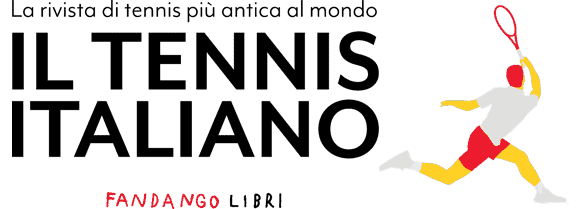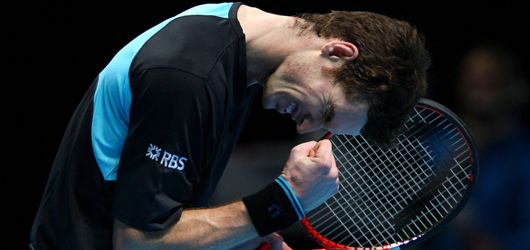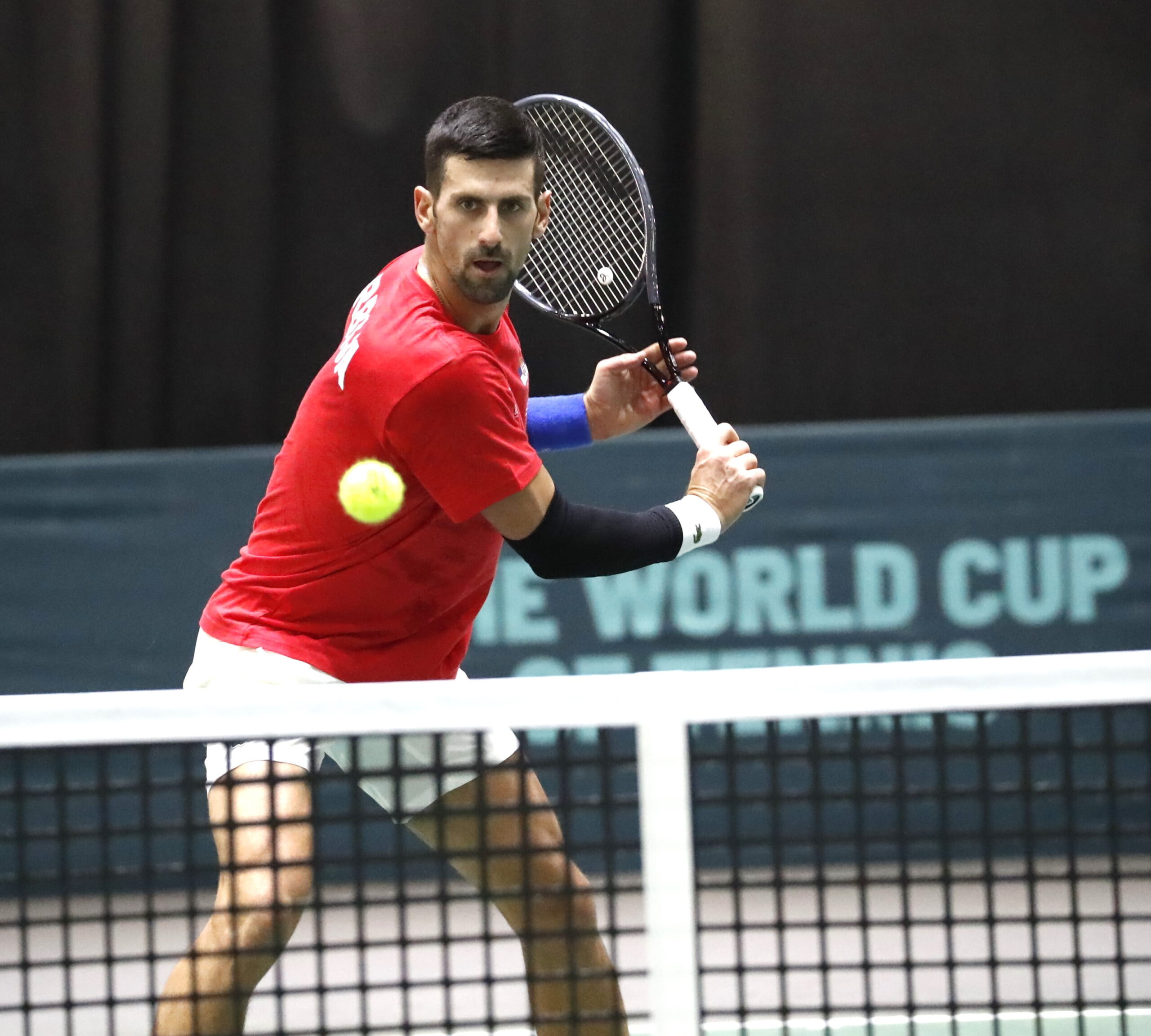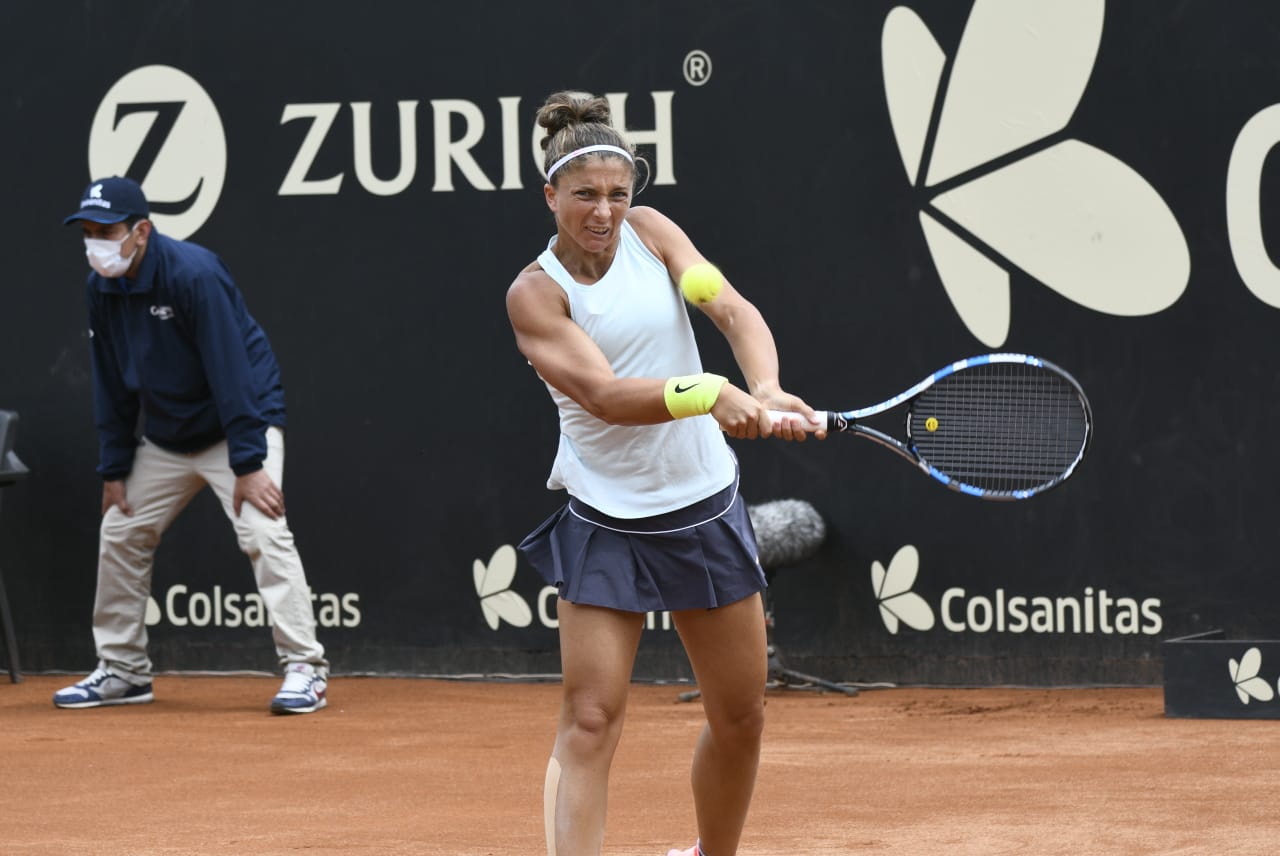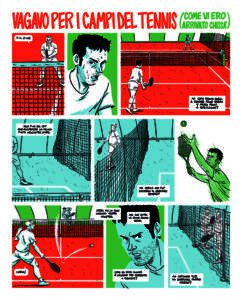da Londra, Giorgio Spalluto – foto Getty Images
Con qualche difficoltà di troppo, ma alla fine Andy Murray porta a casa il suo secondo successo del gruppo A, e può continuare a sperare nella qualificazione. A decidere le sorti del girone, l’ultimo match tra Federer e Del Potro. Una vittoria dello svizzero (che chiuderebbe ovviamente in testa al girone a punteggio pieno) eliminerebbe dalla contesa Del Potro, regalando allo scozzese il secondo posto.
Le cose si complicherebbero in caso di successo serale dell’argentino. Si verrebbe così a creare una situazione di ex-aequo tra 3 giocatori, e si andrebbero a contare prima i set e poi eventualmente i games.
In caso di vittoria in 2 set di Del Potro, sarebbe l’argentino a chiudere il girone in testa (5 set vinti – 3 persi), davanti a Murray (5-4), eliminato Federer (4-4)
In caso di vittoria in 3 set, si andrebbero a contare i game. Questa è la classifica in questo momento:
Federer 2-0, 4-2 set, 32-22 games (+10)
Murray 2-1, 5-4 set, 44-43 games (+1)
Del Potro 1-1, 3-3 set, 27-31 games (-4)
Verdasco 0-3, 3-6 set, 45-52 games (-7)
Murray ha chiuso il girone con questo record: 44-43. Del Potro, per superarlo, deve battere Roger facendo 5 o 6 game più dello svizzero che ha, a sua volta, un margine rassicurante (+9) su Murray
Ricapitolando:
Del Potro si qualifica:
– battendo Federer 2-0: Del Potro 1°, Murray 2°
– battendo Federer 2-1 e facendo almeno 5 game più di Roger (6 nel caso in cui il set perso si concluda al tiebreak)
Federer si qualifica:
– battendo Del Potro: Federer 1°, Murray 2°
– perdendo 2-1 con non più di 9 game di scarto
Il match odierno tra Murray e Verdasco ha confermato tutte le incertezze palesate dallo scozzese al servizio nell’incontro perso contro Roger Federer. Nel 1° set la percentuale di prime di Andy ha veleggiato spesso e volentieri sotto il 40%, con lo spagnolo davvero troppo falloso in risposta, anche quando lo scozzese serviva degli straccetti a malapena sopra le 80 miglia orarie. Dopo aver annullato 3 palle break nel game di apertura ed una sul 3-3, il madrileno era costretto a capitolare nel 9° gioco, al termine di un lungo scambio in cui Murray era bravo a proporre sempre una palla in più al suo avversario, incapace, però, di chiudere una delle tante occasioni a disposizione, prima di affossare goffamente una voleè di rovescio abbastanza elementare. Lo scozzese confermava il break, chiudendo il set per 6-4, al termine di un game inaugurato da 2 doppi falli di fila dello scozzese, ma chiuso al 4° set point. E’ sempre il pessimo servizio del numero 4 del mondo, uno dei leitmotif del secondo parziale, vinto dallo spagnolo al tiebreak, proprio grazie all’8° doppio fallo del match del suo avversario. Nel corso del set, Murray non era riuscito a concretizzare nessuna delle 7 palle break a disposizione, 4 delle quali sul 5-5, subito dopo aver annullato, grazie a un servizio vincente, un set point a Verdasco, alla prima palla break del match, dopo un’ora e 3 quarti di gioco.
Il terzo set si apriva subito con un’opportunità per lo scozzese di brekkare l’avversario, prontamente sventata da un Verdasco bravo ad aggrapparsi ancora una volta al suo portentoso servizio mancino da sinistra. Per lo spagnolo si trattava della 12° palla break annullata, su 13. Sarà quello l’ultimo breakpoint del match. Per la seconda volta in 2 giorni, Verdasco riesce a rifugiarsi nel tiebreak del 3° set, come già accaduto con Del Potro. Una voleè di rovescio in rete del numero 8 del mondo, regalava a Murray il primo minibreak del tiebreak. Lo scozzese, però, sprecava tutto con una seconda di servizio troppo fiacca per non essere preda della risposta aggressiva dello spagnolo che però, macchiava prima con un doppio fallo (sul 3-2), poi con una volee in corridoio (sul matchpoint), la sua coraggiosa partita ed il suo sfortunato Master, chiuso con 3 sconfitte, in verità abbastanza preventivabili per un giocatore perseguitato dagli acciacchi oramai da qualche mese, e che avrebbe terminato anticipatamente la stagione, se solo non si fosse ritrovato ancora in lotta per un posto alle sue prime Atp World Tour Finals. Il madrileno, infatti, aveva dichiarato subito dopo gli US Open di voler posticipare un’operazione al piede consigliatagli caldamente dal suo staff medico, proprio per continuare a sognare un ticket per Londra. La partecipazione in extremis di Soderling, autore fino a questo momento di un percorso netto, costa a Fernando anche l’8° posizione mondiale, al termine comunque della sua migliore stagione. Sarà difficile ripetersi, visto che già a gennaio sarà costretto a fronteggiare la pesante cambiale della semifinale di Melbourne.
Albert Costa, presente sugli spalti della 02 Arena, non ha certo di che sorridere in vista della finale di Davis del prossimo fine settimana. I suoi 2 singolaristi usciti con le ossa rotte da questo Master, dovranno fare in fretta a cestinare scorie negative di questa debacle, adattandosi in men che non si dica alla terra battuta del Palau San Jordi di Barcelona.
Per Murray non resta che armarsi di carta, penna e calcolatrice e sperare che Federer, battendo Del Potro, gli risparmi tutta questa fatica, regalandogli direttamente la qualificazione senza passare dal purgatorio del quoziente games
© 2009 “Il Tennis Italiano” – Tutti i diritti riservati
[$EmbedVideoYouTube ID:="ISt-beH7dvU"; $]
Q. There’s been a lot of confusion about the qualification process, even in here until the last few minutes. How much did you know going into the match about what you had to do and how difficult is it to play under those circumstances?
ANDY MURRAY: It was tough. But I needed to win the match. I mean, I had to focus on that. I knew if I won the match, then, you know, there was only one way that I couldn’t go through, and that was if Del Potro won in three sets, then I think it would go down to the games because all of us would have the same set.
So I just had to focus on winning. Then there’s a very slim chance of me going out.
Q. There was some suggestion you spoke to Gerry Armstrong in the third set. Was that some clarification?
ANDY MURRAY: Yeah, I just asked if the games was done on games won or the percentage of games, you know, because obviously it goes on the percentage of sets won, not how you’ve won. I didn’t know if it was just the amount of games you won or if it was the percentage, so that’s what I asked him.
Q. How tough is it playing a guy like Verdasco? Kind of a license to just swing freely today. That presumably made life a lot more difficult.
ANDY MURRAY: It was tough. He played ridiculous on, you know, the big points in the second set, and to a certain extent in the third set, as well. I mean, served huge. When he’s behind in games and on break points, his second serve, which in previous matches I’ve been able to attack, he was even acing off that, putting me in really tough positions.
You know, someone hits close to the line on these courts it’s tough because the ball stays very low and you have to hit up. He was able to dictate the points.
But stayed strong.
Q. With the prize money at stake, the number of people coming to watch these matches, how unsatisfactory is it that we’re at the stage where people are not quite sure who goes through under what permutation?
ANDY MURRAY: I don’t actually think that it’s that complicated, you know. It’s not that hard to work out the percentage of sets that guys have, you know. It’s like two sets minus one set. It’s not that difficult.
But everyone – I don’t know why – makes it sound so complicated. Whoever wins the most sets, you know, has the best set percentage goes through. If not, it goes down to the percentage of games. The people that go through are the ones that deserve to.
Q. 12 months ago you won your last group match. Took you three hours. The effort of that seemed to cost you the next day in the semifinals. If you go through, do you feel having an extra day tomorrow will help you and you’ll be in good shape for the semis?
ANDY MURRAY: Yeah, it makes a huge difference. You know, that’s why, you know, in tournaments that work like this, it’s a huge advantage to play on the first day because, you know, if, for example, I played this match against Verdasco tomorrow night, and I played three hours and finished, you know, at midnight, you know, you’re in bed. By the time you finish your press, warm-down, eating, and stuff, you’re in bed at 3:00 in the morning. So, of course, big advantage.
If I play the night match on Saturday, I don’t know what’s gonna happen. I could potentially have over 40 hours’ rest, which definitely helps, whereas last year I had under, you know, 24 hours’ rest before I played against Davydenko.
Makes a big difference.
Q. Overall how would you rate the week so far, your three performances?
ANDY MURRAY: Well, if I go through, it will have been good enough. I think from the back of the court, striking the ball the best I had done today. You know, didn’t make many errors. You know, hit quite a lot of winners, too. Served a lot of aces.
You know, the first match was up and down, the match against Federer, I was disappointed with. And today, obviously I’m happy to come through, but I didn’t think that I played a poor match at all. I thought the standard of tennis, you know, the way that he was playing, I hardly — I think I gave him maybe one breakpoint the whole match, however many service games I played. So I didn’t give him too many chances.
Q. How do you feel physically after these three matches?
ANDY MURRAY: Tired. Obviously a long one. But, like I said, I got a long time – hopefully – before I play the next round. You know, I’m sure everyone’s feeling a little bit stiff and sore and tired, you know, at this stage of the season.
But hopefully I’ll be fine for the next match, if I get to play one.
Q. Do you think Nadal has a small crisis? What do you think about his game now?
ANDY MURRAY: I’d love to be in his crisis (smiling). You know, everyone in sports, especially individual sports, you know, based on — I don’t know, since he came back from his injury, you know, he lost to Del Potro I think in Montréal, he lost to Djokovic in the semis in Cincinnati, he lost in the semis of the US Open, you know, he made the final in Shanghai, I think the semis the week before that, and obviously here he didn’t play his best tennis, but it’s a court that I think is difficult for him.
His results have still been pretty consistent. But it’s tough here. Obviously if the surface doesn’t suit your game, you’re playing against the best players in the world, that if you’re not playing your best, there’s a chance that you lose. I don’t think that Nadal’s in any crisis whatsoever.
Q. Your initial thoughts on tonight’s match with Federer and Del Potro? Will you be staying to watch the game?
ANDY MURRAY: No, I won’t stay. I’m going to go home, get some rest, you know, and then see what happens with the match. I definitely won’t watch too much of it. Got to try and look after my body the best that I can, if I get to play another match.
Q. Can I ask you about the time ruling out there. There wasn’t a changeover where you didn’t go out there and have to wait a fair amount of time on the baseline for Fernando to come out. Before the match, you were kept waiting. Do you have any thoughts that maybe these rules should be tightened up a little bit at the moment?
ANDY MURRAY: Well, I think, you know, it’s one of those rules where the umpire, you know, there’s a bit of leeway there. If I was to — you know, I don’t know what the cutoff is like on swear words. I don’t know what words you can and can’t use. But, you know, there’s obviously a cutoff.
For me, if it’s 25 seconds, you know, that you get between the points — it changes I think between the ITF and the ATP, I think some of the tournaments it’s 20 seconds, some of them it’s 25. But if you’re over a couple of times, there has to be a warning. There’s no excuse for that. And when the umpire calls time, you should be out of your chair. That’s it. That’s the reason why they have those time limits.
So, you know, if the umpire calls time and your opponent is allowed to sit there for an extra 15 seconds, then I just don’t think you should be allowed to do that.
Q. Did it get to you at all out there tonight?
ANDY MURRAY: No, it doesn’t bother me. It happens in a lot of matches. I always get up. I even get told a lot of times by the umpires to stay sitting because, you know, with the TV, you know, when they have TV time changeovers, they want to basically come back to you sitting on your chair, you know, I guess you walking back to the back of the courts. The umpires will tell you to slow down a little bit.
But you want to try and see a game played at a pretty fast pace. The match today was like three hours long. You know, if that was five sets, it could have been a lot longer. So it’s tough for people, I guess, to watch a match for that long, especially if guys are taking long in between the points.
Q. Fernando Verdasco has fared quite well in all the games he has played. Did his game surprise you to some extent, because he was quite consistent?
ANDY MURRAY: Yeah, well, that’s the reason why he’s here. This year he’s not been that inconsistent. He’s been very consistent throughout the year. In all of the big tournaments, he’s reached a lot of quarterfinals. You know, so I was expecting a tough match against him. I’ve never beaten him really, really easily the last couple of years.
But, yeah, I mean, he served great. You know, after the first set, he kind of played like he had nothing to lose, was hitting huge forehands, huge serves. You know, even when he was down breakpoint, he was going for huge shots, as well. So I don’t know if that surprised me or not, but it was tough.
Q. You sometimes say your own name when you’re annoyed. Is that something you’ve taught yourself to say instead of swearing?
ANDY MURRAY: No, whatever comes out. Unfortunately, sometimes it’s the wrong word that comes out and I get in trouble for it. But, no, I try not to (laughter).
Q. You only won one breakpoint out of 13. I appreciate he hit some big shots on those 13 points, but did you come up short a bit in some of the big points, do you think?
ANDY MURRAY: No, ‘cause I won, you know, the third-set tiebreaker, obviously. Well, it was what it came down to. Obviously, I would have liked to have broken him, you know, and taken some of the chances. But maybe on two or three of them I had, you know, opportunities to do a little bit more with my return.
But, you know, I didn’t do that. Unfortunately, I can’t play great on every point. From speaking to, you know, my coach, Miles and Alex, from their side, from watching the match, they felt like, you know, he came up with great shots and great serves. And that was the reason why I didn’t manage to break him.
Like I said, when someone’s playing without kind of anything to lose, it makes it a little bit harder for you, as well.
Q. You said your game was good enough up to now. Is there something you wish to do or have to do better if you’re in the semis, if you want to win the tournament?
ANDY MURRAY: Well, I mean, if I play like I did tonight, if I serve well, like I did, you know, and I felt like I hit the ball the best that I had done from the baseline today, I felt comfortable when I was being aggressive. I felt, you know, comfortable when he was on the defense, then, you know, I’d be happy, you know, going forward.
Obviously, I created a lot of chances, as well; I just didn’t take them. You know, against some of the other guys maybe, you know, he’s probably got the biggest game in the tournament, so I don’t think guys would be able to kind of hit those sort of shots consistently. So if I play like I did tonight, I’ve got a chance.
Q. You survived many break points against you. What do you put this down to? What helped you save so many break points?
FERNANDO VERDASCO: I don’t know exactly, no? I was just trying to win the points, trying to play good. Some days you don’t win the break points, some days you win the break points. Every match is different. I say that many times. Every match have different situations. You know, there are some matches that first point you have against you lose, and in another match you have 10 or 12 and you win all 12. Tennis is like that.
Q. Did you feel more relaxed, that you had nothing to lose, went for some shots? Adventurous?
FERNANDO VERDASCO: No. I was not only nothing to lose. If I won today, I was still having chances to pass to semifinals if Roger wins tonight. So it was not for me like a funny match, no?
I was trying the same like in the other two matches before.
Q. Can you tell us about the Davis Cup. How important is it for you now since you were the hero last year?
FERNANDO VERDASCO: Davis Cup is always important for me, and this time it’s not going to be different. We play the final in Spain. We will try to win like always.
Q. How tough is it to have got so close to winning all your matches but come away losing all three?
FERNANDO VERDASCO: You know, of course is tough, no, when you play good and you lose. And also when you have, in all three matches, to win, close to win. But, you know, the positive thing is against the No. 1, 3 and 5 in the world, or 4 and 5 in the world, I was really close to win.
So that means that I have the level to win against these guys. I just need to improve a little bit more my tennis and, you know, maybe next year I will win these matches.
Q. Thinking about the Davis Cup, you and Rafa are out of this tournament. You played strong games. The Czech players are practicing in a quiet atmosphere. Do you think it could be something important in the balance of this Davis Cup?
FERNANDO VERDASCO: I think that, you know, of course is important, no, to have more time to prepare the Davis Cup final. They were practicing already one week in clay, and Rafa and myself, we didn’t start yet because we was playing here.
But we will try to get used to it as soon as possible, you know, for that, for that final on clay. I will go tomorrow straightaway to Barcelona. So, you know, I think it’s important, of course. But I hope, and all Spain hope, that is not gonna be like very important and is gonna change the tie, no?
So we’ll see.
